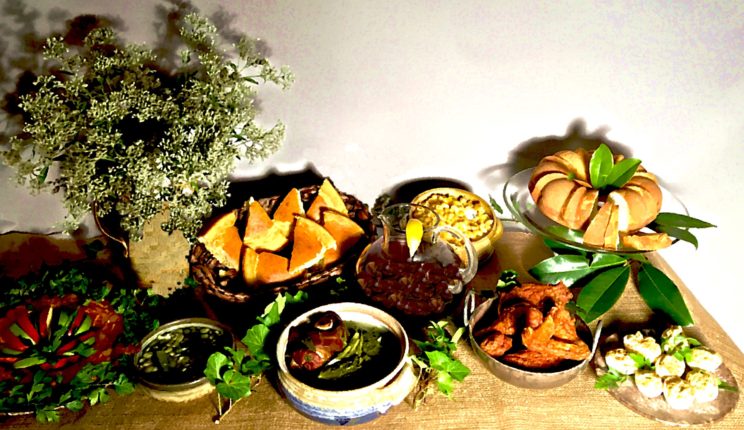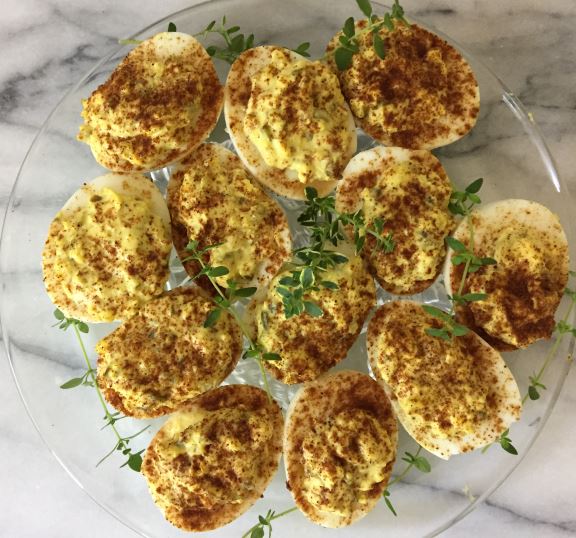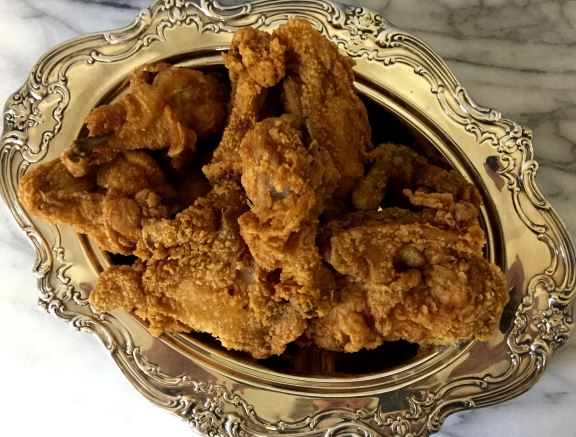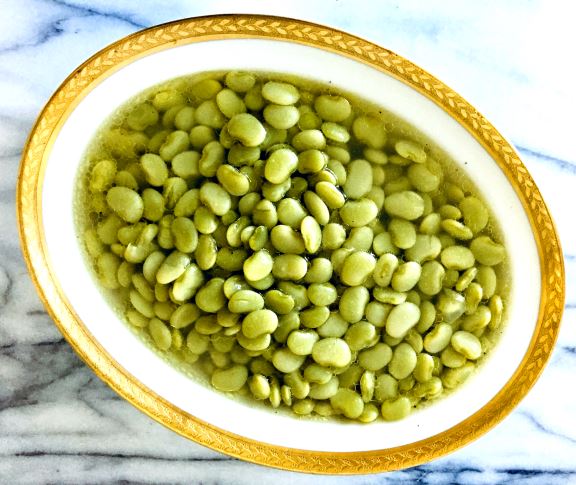The Southern Spread

by deborah fagan carpenter
Our culture, our history, our spirit, and our hospitality are some of the ingredients. Southern foods are heavily influenced by African, English, Scottish, Irish, French, and Native-American cuisine, and although most of them are served across the country today, there are foods in the U.S. that are strictly thought of as SOUTHERN. There’s Creole, Lowcountry and Floribbean, and I’m not sure where fried chicken and deviled eggs fit into the mix, but to be certain, they perform with a southern accent. In “The Southern Spread,” we’re exploring southern foods and traditions.
May Feature:
Southern Funeral Food
“They don’t do this in Baltimore; people just go to a restaurant,” remarked an old friend as we were making our way around a beautifully laid buffet table at a post-funeral reception. “I love that southerners keep going to this much trouble,” she said while marveling at the amazing amount of familiar food that had been lovingly prepared by neighbors and delivered to the home of our recently widowed friend.
Hands down, southerners have the market cornered on honoring the dead with food. Nobody anywhere does funeral food or post-funeral gatherings better. We know that at a time of loss food is about ease and comfort, and, if anybody knows how to do comfort food, it’s us. Also, prone to exaggeration, we figure that if one recipe of something is good, two or three different varieties are even better.

Humorous and irreverent southern writer, Julia Reed frequently tells the story of the day her grandparents were killed in a car accident. When her grief-stricken Mother was walking out the door to begin making arrangements, she called over her shoulder, “Go clean out the refrigerator!” She knew all too well that a mountain of food was about to descend upon their home. When the word spreads that somebody has died, southern women spring into action, and the home of the family is bombarded with casseroles, desserts, and multiple versions of macaroni and cheese.
Why do people always bring food to the family when someone dies? Because, they don’t know what else to do and they want to do something, so, their condolences are expressed with food. On a more practical note, friends know that the family of the deceased has way too much on their minds to think about making food for themselves or, for the cousins from Baton Rouge or Yazoo City or wherever who’ll probably be spending the night. And, after normalcy has resumed and the cousins have gone back to Baton Rouge or Yazoo City or wherever, they might not feel like eating, much less like cooking, but a nice neighbor brought a casserole that they can pull out of the freezer. More importantly, there will likely be a post-funeral reception in the home, or the church hall, or somewhere, and not to worry, friends, relatives, neighbors, or the “church ladies” have it covered.

Nothing says solace like southern fried chicken, but a couple of years ago I attended a post-memorial service celebration in my south Mississippi hometown that rivaled the food and presentation of any party ever. No pedestrian fried chicken to be found. A nearly 80-year-old cousin of the deceased insisted on hosting a party in his honor, and it was southern elegance at its finest. Held in her home, she had almost single-handedly prepared all of the food herself, which was presented as only a genteel southern woman could achieve.
In the somewhat informal gathering room at the entrance of the home, guests were greeted with a chafing dish brimming with hot crab dip accompanied by toast points, and a seemingly endless supply of cheese straws, and, that was just an inkling of the lavish spread that was to follow in the dining room. Upon an antique tablecloth, surrounding a gorgeous spring floral bouquet in a crystal vase, sat an extravagant menagerie of scrumptious party food, elaborately displayed. It took all the strength I could muster not to take a picture — tacky — but ravenous after a long drive, I resorted to sampling everything.
As memorable as that gathering was, however, it was somewhat of a break from typical southern “funeral food.” Except, of course, for the cheese straws, which are a must for any decent southern social event, most post-memorial/funeral celebrations are a little more down-home.
“In Louisiana, one of the first stages of grief is eating your weight in Popeye’s fried chicken. The second stage is doing the same with boudin. People have been known to swap the order. Or to do both at the same time.”
—Ken Wheaton, Sweet as Cane, Salty as Tears
Typically, it’s all about comfort food, so naturally, southern fried chicken tops the list. Some generous soul has probably provided cheese straws — maybe one plate of extra hot ones — conveniently placed at the head of the table with deviled eggs, (made with homemade mayonnaise, of course) and bread and butter pickles that some resourceful church lady put away last summer. Yes, those giggly congealed salads usually make an appearance, along with several varieties of potato salad, tossed salads, layered English pea and bacon salads, and tomato aspic.
There are tuna casseroles, chicken casseroles, ground beef casseroles, and with any luck, a pineapple casserole or two. There are actually “funeral casseroles” and “funeral potatoes,” and several different recipes of macaroni and cheese can be expected. Ham is a given, and placed nearby are homemade biscuits, yeast rolls, homemade mayonnaise and English mustard, cheese grits, and corn pudding. In the Mississippi Delta, there’s even a potato recipe called “Liketa Died Potatoes.” I kid you not!

Every self-respecting southern woman has a package or two of baby butter beans in her freezer, put away for just such an occasion. Chicken salad is a probability, often in the form of tea sandwiches that share a plate with pimento cheese finger sandwiches. Some of us go straight to the dessert table where hopefully, there will be pound cake, coconut cake, caramel cake, strawberry cake, coconut cake, (did I say that twice?) chess pie, French silk pie, key lime pie and lemon meringue pie.
In parts of the country there are catering companies that specialize in nothing but post-funeral food, but we southerners are having none of that! We have this thing down to a fine art, to the point of numerous books being written on the subject. Mississippi Delta natives, Gayden Metcalfe and Charlotte Hays wrote BEING DEAD IS NO EXCUSE: The Official Southern Ladies Guide to Hosting the Perfect Funeral, and Memphian, Perre Coleman Magness authored THE SOUTHERN SYMPATHY COOKBOOK: Funeral Food with a Twist. Both books are hilarious and are a compilation of ever-popular “funeral recipes.”
Loss of loved ones is something we all experience at one time or another and it’s undoubtedly a solemn occasion. Likewise, funeral food in the South is serious business.
Photos: Deborah Fagan Carpenter


